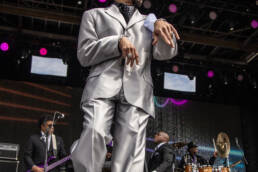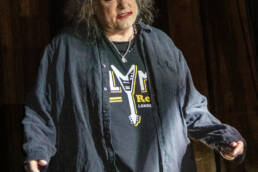Tommy Shaw: The Southern Soul of Styx
The Song That Pulled Him In
Picture a teenage Tommy Shaw in Montgomery, Alabama, hunched over a beat-up guitar in the early 1970s. The radio’s crackling with The Beatles and The Rolling Stones, but it’s a local gig—some bar band tearing through a sloppy cover of “Hey Joe”—that lights the fuse. Tommy’s 16, restless, and itching to escape the humdrum of Southern life. His mom taught him piano, his dad sang around the house, but that night, watching sweaty hands wrench magic from strings, he knows: music’s his way out. It’s not about stardom—it’s about belonging, about finding a tribe in the chaos of sound. Within a year, he’s gigging with anyone who’ll have him, a kid with a dream too big for Alabama to hold.
The Boy from the Cotton Fields: A Biography
Tommy Roland Shaw was born September 11, 1953, in Montgomery, Alabama, to Dalton, a machinist, and Mildred, a homemaker with a soft spot for music. The Shaws were working-class folks, rooted in the South’s red dirt and resilience. Tommy was the youngest of three, a wiry blonde kid with a grin that hid his hunger. Music wasn’t a luxury—it was a lifeline. He picked up piano early, thanks to Mildred’s lessons, and by 12, he’d nabbed a guitar, teaching himself by ear. School was a blur; he’d rather strum than study, and by high school, he was sneaking into bars to watch bands, dreaming of the stage.
Life wasn’t all chords and harmony. Tommy’s teenage years were scrappy—odd jobs, small-town boredom, and a gnawing need to break free. In 1972, at 19, he left Montgomery for good, chasing gigs in Bowling Green, Kentucky. He married Pam Cupit in 1976, a union that bore a daughter, Hannah, but crumbled by 1980 under the strain of his rising career. A second marriage to Jeanne Mason in 1986 ended in divorce too, but stability came with Pamela Donnelly in 1997—a partnership that’s held strong.
The Career That Soared with Styx
Tommy’s road to fame started with Harvest, a bar band scraping by in Alabama, and MSFunk, a funk-rock outfit in Chicago where he cut his teeth in the early ’70s. Fate struck in 1975 when Styx, a prog-rock act from Chicago, needed a new guitarist after John Curulewski split. Tommy auditioned—nervous, 22, and fresh off a gig at a bowling alley—and floored them with his voice and riffs. By December, he was in, joining Dennis DeYoung (vocals, keys), James “JY” Young (guitar), and brothers Chuck (bass) and John Panozzo (drums). His debut, Crystal Ball (1976), bore his stamp with the title track, but The Grand Illusion (1977) made them legends, thanks to “Come Sail Away” and Tommy’s “Fooling Yourself.”
Styx’s peak was the late ’70s and early ’80s—Pieces of Eight (1978), Cornerstone (1979), and Paradise Theatre (1981) churned out hits like “Renegade” and “Blue Collar Man.” But egos clashed; DeYoung’s theatrical bent irked Tommy and JY, and by 1983, after the divisive Kilroy Was Here, Styx imploded. Tommy went solo with Girls with Guns (1984), then formed Damn Yankees in 1989 with Ted Nugent, Jack Blades, and Michael Cartellone. Their 1990 debut spawned “High Enough,” a power ballad that roared up the charts. Styx reunited in 1995 (sans DeYoung by ’99), and Tommy’s been their anchor ever since, with Chuck, JY, Todd Sucherman (drums since John’s 1996 death), Lawrence Gowan (keys), and Ricky Phillips (bass).
Beyond bands, Tommy’s guested with The Guess Who and jammed with pals like Steve Lukather of Toto. No major film roles, but he’s popped up on TV—like That ’70s Show in 2000 as a music store clerk. Relationships? His friendship with Nugent’s made headlines, especially when Ted’s wild politics stir the pot. Awards are slim—Styx nabbed a People’s Choice in 1980, but no Grammys. A 2017 Rock and Roll Hall of Fame snub still stings fans.
The Hits That Define Him
- “Renegade” (1978) – Written by Tommy, this gritty rocker hit No. 16 and became Styx’s outlaw anthem.
- “Blue Collar Man (Long Nights)” (1978) – Another Shaw original, it peaked at No. 21, a blue-collar cry with soaring hooks.
- “High Enough” (1990) – Co-written with Nugent and Blades for Damn Yankees, this ballad soared to No. 3.
- “Crystal Ball” (1976) – Tommy’s first Styx gem, a brooding beauty he penned solo.
Controversy in the Spotlight
Tommy’s dodged major scandals, but Styx’s 1983 breakup was a soap opera—public spats with DeYoung over Kilroy Was Here’s concept left fans picking sides. Tommy called it “a fiasco” years later. His Damn Yankees stint ruffled feathers too; some Styx diehards felt betrayed. Offstage, he’s kept it clean—no arrests, no tabloid meltdowns—just a quiet feud with DeYoung that simmers still.
A Night in the Spotlight
Let’s rewind to March 19, 1979, at the Spectrum in Philadelphia. Styx is riding Pieces of Eight, and 18,000 fans are electric. Tommy’s in a frayed denim jacket, tearing into “Renegade” when a string snaps mid-solo. Without missing a beat, he grabs JY’s spare guitar from a roadie, mid-stride, and finishes the lick—crowd roaring like a thunderstorm. Later, he dedicates “Blue Collar Man” to “every working stiff out there,” and the place erupts. It’s vintage Tommy: raw, real, and relentless—a night Philly still talks about.








